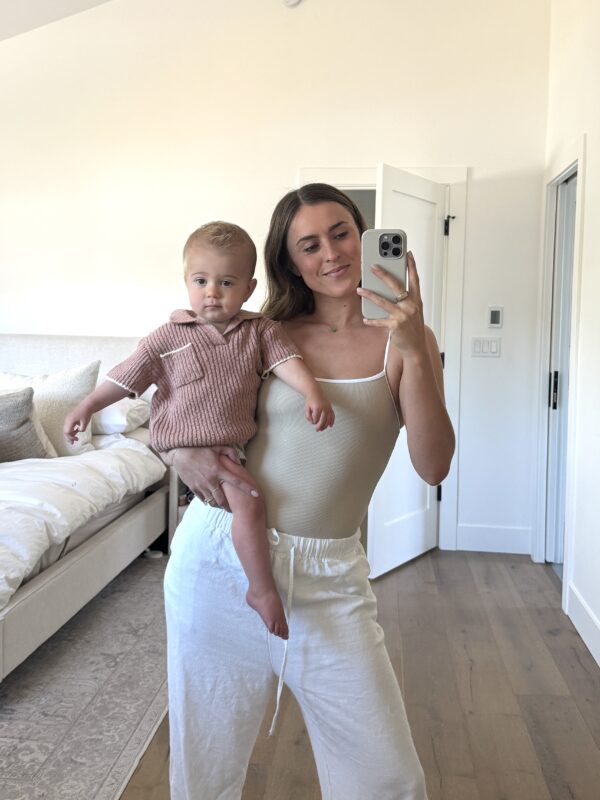
I’ve been promising this post ever since Bridger and I bought our first home together in May of this year. If we’re being completely honest, Bridger put us on the right track and basically taught me everything along the way… it’s his job after all. He’s a mortgage lender and damn good at it if he can get even me to understand the process haha. I mean, it’s hard! No one teaches you this stuff, not even in school, which is wild to me.
Anyways, I love that he’s able to break it down for people who either don’t know how to get started or need tips along the way. Since I received so many questions about our own process of buying our house, I thought it could be very beneficial to share some tips & tricks that may help YOU buy your first, or second, home!
Head to my IGTV here to see Bridger answer the most popular questions via video and scroll down on this post for more questions answered.
HOW MUCH SHOULD YOU SAVE FOR A DOWN PAYMENT? IS IT TRUE YOU NEED 20%?
You can buy a home without putting the magic 20% down. 20% allows a buyer to avoid an extra monthly payment called Mortgage Insurance (MI). In a perfect world, a borrower would put 20% down and avoid mortgage insurance making the mortgage less risky for a bank & making the payment lower for the borrower by avoiding MI. In fact, 72% of first time home buyers in 2018 put down 6% or less (Freddie Mac).
First time home buyer programs require 3% down for conventional products and 3.5% down for FHA (Federal Housing Administration) products. Remember that every 5% you put down gives you qualifying metrics in the eye of the bank. For example, you would likely qualify for a better rate & lower monthly mortgage insurance with 10% down as opposed to 5% down.
COULD YOU PUT DOWN JUST 0%? PRO’S/CON’S?
There are programs that allow buyers to put down 0%. You will still be liable for closing costs and prepaids, which in general, are close to 2.2% of the purchase price. VA (Veteran Affairs) is the most popular 0% down program, and in fact, this is the one program I do suggest borrowers strongly consider the 0% down option. VA does not have mortgage insurance even with 0% down. Just like other loan products you will still receive better interest rates per 5% you put down.
I personally suggest most buyers who are considering grant or bond programs take a long look at their monthly budget before deciding to utilize these products. A lot of the time, there are things like lowering debt or practicing a more disciplined monthly budget that can prepare first time home buyers to own a home. A lot of 0% down products are higher interest rates than other products and therefore buyers can put themselves in a better situation by saving even a 3% down payment.
HOW DO YOU FIND THE RIGHT LOAN/MORTGAGE RATE?
The right loan & rate are all going to be dictated by your cash/debt/credit. This is the importance of working with a professional mortgage lender like myself & having this all figured out before shopping for homes. If you are a veteran you will almost exclusively be utilizing the VA lending products. Lots of companies, including my own at Guaranteed Rate offer these programs. For the rest of us, it is usually a pretty straightforward decision between FHA and Conventional. Generally, with first time home buyers, after they make the application we put the two side by side in a comparison where I’d go over what the benefits are of each program. If you are planning on putting the minimum down and have a credit score below 700, you will most likely have a much lower monthly payment going with an FHA product. I use the side by side comparison because as a visual learner myself, it helps quite a bit to see the numbers side by side.
HOW LONG DOES THE PROCESS TAKE TO GET A LOAN? WHEN SHOULD YOU GET PREAPPROVED FOR THE LOAN WITHIN THE PROCESS? DOES IT DING YOUR CREDIT SCORE EVERY TIME YOU APPLY?
Getting pre approved has become a straightforward process with most mortgage companies having some version of a digital application process. An application can take as little as 5 minutes to fill out and includes Name, Employment, Banking Information, Credit Pull. Borrower’s credit will be affected by 4-6 points listed as a credit inquiry, but don’t worry– these points generally come back within 30 days.
The home buying process itself is completely dependent on the buyer and how much work you accomplish upfront. For a lot of our buyers, we try and utilize an Under Written Pre Approval before we start submitting offers to make your particular offer more competitive. In that case, from an accepted offer to closing date would likely be around 21 days. For buyers who don’t utilize that option you probably want to budget 30 days from accepted offer to closing date.
Home buyers should first reach out to a mortgage professional to get a good gauge on their readiness to buy a home. Generally, this conversation can be done within 15 minutes & will give a buyer clarity on A) if they are ready to buy or B) have some things to work towards.
HOW DO YOU DETERMINE WHAT PRICE YOU CAN AFFORD? HOW TO SET A REALISTIC PRICE POINT/BUDGET?
A general rule of thumb is that your liabilities (monthly credit card payment, student loans, car payment) + your housing allowance should not be more than 43% of your gross income. To calculate your Gross monthly income, either seek help from a mortgage professional or take your pre tax salary and divide by 12. If you are paid hourly the equation is (hourly rate) x 40hrs x 52 weeks = Gross Annual Salary / 12 months.
ANY TIPS ABOUT CLOSING COSTS/HOW DO YOU ESTIMATE WHAT THEY’LL BE?
We estimate 2.2% of the purchase price for pre paids (taxes and insurance) and closing costs. This can vary by state but has proven to be a pretty accurate indicator for the most part. Closing costs can be paid for by the seller and there are negotiating tricks that work wonders. Working with great realtors can save you some serious dollars in this department.
HOW DO YOU START SAVING FOR A HOME?
Make it a priority. First of all, you need to be aware of where your money is currently going every month. Either track your spending for a month or make yourself a budget and stick to it. Include the money you want to save every month in the budget and pay yourself that money! It seems like a daunting task, but there is no better time to start than right now. Imagine how much closer to your goal you’d be if you would have started 12 months ago, and I promise you will feel the same in 12 more months.
IN ADDITION TO THE DOWN PAYMENT, HOW MUCH SHOULD YOU PLAN TO HAVE SAVED?
This is why I suggest having a conversation with a mortgage professional before just picking out a random % to put down. There is a certain amount of financial security by leaving 6 months of living expenses after buying a home that needs to be accounted for. Now, your first payment date can be adjusted different ways when buying a home to allow you to save additional dollars, but for the sake of this blog post have this conversation with the lender and compare the payments with different down payment %’s.
WHAT ARE THE ROLES OF THE MORTGAGE LENDER, THE BANK & THE AGENT?
Mortgage Lender: works with you to find a sweet spot for your monthly mortgage payments. The good ones will work backwards and find a comfortable payment based on your financial situation & translate that into a total $ amount for you to buy a home. For example, if you want your monthly payment to be around $2500, then a good lender would tell you what that equates to in terms of purchasing power on a home.
Bank: supplies the financing for you to purchase the loan. They will be under writing your qualifications to make sure you check all the boxes and are eligible to borrow the amount of money needed to purchase a home within their framework. Remember that with the addition of Dodd-Frank banks & lenders are forced to prove your ability to repay the mortgage which has lead to better mortgages being made & a more stable lending market.
Real Estate Agent: We are going to focus on buying side agents. The role of a good buyers agent (typically realtors can help both buyers and sellers) is to be an expert in the area you are shopping. Knowing school districts, neighborhoods, trends in the market are all things that can benefit buyers when working with great agents. Of course the largest part of the realtors job is negotiating a winning deal for their buyers. Great realtors will understand market trends & how much they can get out of a seller while still securing the home of your dreams. It’s always good to work with realtors who have experience and it’s also the case when great agents work with great lenders, so don’t be afraid to ask for a referral!
HOW DO YOU MOVE FORWARD WHEN YOU HAVE A SIGNIFICANT OTHER WITH BAD CREDIT, BUT WANTING TO BUY?
This is a factor that can dictate which mortgage product you should utilize. For example, with conventional products, both spouses do not need to be on the mortgage, but both can be on title for the home. When utilizing an FHA loan both partners must be on the mortgage and on title for the home. Typically, if the bread winner of the household also has poor credit, it’s going to be beneficial to figure out what is impacting the score and correcting that first before buying.
3 TIPS IN IMPROVING YOUR CREDIT SCORE?
- Isolate why your credit score might be low. There are TONS of factors that go into the algorithm that spits out your credit score. They are categorized as such: Payment History (paying on time), Credit utilization (of the credit limits you have on cards, how high are the balances compared to the max limit), length of credit history (how long have credit accounts been open. Longer history of on time payments = better score), New Credit (if you just took out a loan for a car within the last few months it will show as a new account and you have not proven you can make that payment for a decent length of time), Credit Mix (Personal loans, credit cards, installment loans. If you have good history with all types of credit it helps).
- Pay Down Debts: When working on credit there is one sure thing that will always help your score. Borrowing money and paying it back shows credit companies you can borrow responsibly. Keep in mind your score indicates if other creditors should lend to you. Paying old creditors back and keeping lines of credit open makes you an ideal borrower & therefore improves your score.
- Have 3 open lines of credit: while opening new credit will hurt your score in the short term, having multiple lines of credit will show creditors that you can handle credit responsibly.
SHOULD YOU PAY OFF STUDENT DEBT FIRST? OR SAVE FOR A DOWN PAYMENT?
This question depends A LOT on your current living situation. If you have the option to live at home after school and your preference is to pay down debt quickly, then that is going to quickly improve your monthly debts, but also your credit score by paying off those loans. If you do not have access to cheap living, then I believe there is a balance to the two. You should always be saving towards establishing a nest egg of living expenses AND a “what if” fund.
Remember that student loans are able to have Negative Amortization schedules. Meaning, that these loans can have minimum payments lower than the interest due on the loan per month. In english, if you make a negative amortization loan payment, the balance of your loan will actually go up!! So make sure you are making payments on these loans that allows them to be paid off in a decent amount of time. If you are able to make payments of that nature and save for a down payment then I believe you are moving in the right direction. You can always spend that money to pay off the loans in the future if you choose to.
1ST STEP: FINDING A REALTOR OR MORTGAGE LENDER?
Most people mix this up. They go to an open house for fun and end up sourcing a realtor before finding a lender. This isn’t the worst situation and happens a good amount. However, not everyone is ready to be buying a home. This is why we recommend you find a lender first who can help determine if you’re ready to buy and suggest tips you can do to improve your status with a bank.
RENTING VS BUYING? IS IT WORTH IT TO BUY IN AN EXPENSIVE MARKET? NYC, CA, SEATTLE?
*DISCLAIMER* I do not pretend to be an expert in every housing market so I would definitely recommend speaking with a realtor in your area. Generally, you will not find an area that commands high prices for homes and doesn’t command an equally high amount for rent. When we look at renting and buying side by side, I see tons of benefits to buying a home & only a few to renting.
Owning a home allows buyers the following advantages: Appreciation: your home can increase in value! 100% of mortgage interest is tax deductible on the first 750k of borrowed money. Up to $10,000 in property taxes are able to be deducted annually. Mortgage insurance is 100% tax deductible. Forced Savings Account: you are paying down the balance of your loan and can recoup that equity by selling the home or doing a cash out refinance.
Renting allows for flexibility and less upfront fees. However, in high cost areas it’s likely that your rent will increase year over year unless your city has rent restrictions. If you opt for a fixed rate mortgage, your payment would only adjust if your taxes or homeowners insurance changed.
CAN YOU TALK TO A LENDER BEFORE YOU’RE READY TO BUY?
Yes, and I strongly encourage doing so. A lot of what we would go over in that meeting is also in this blog post, but having the conversation never hurts. It can be helpful to have someone to hold you accountable and make sure your moving in the right direction. I’m truly happy to help! I can work in any state besides NY. You can reach me at [email protected]
IS IT WORTH BUYING A HOME EVEN IF YOU KNOW IT WON’T BE YOUR LONG-TIME HOME?
Buying a home is definitely a long term investment. To buy a primary residence, you must have the intention to occupy the home for 12 months. I would say if you are buying your first home that it would be smart to buy a home that at least fits your needs and goals for 3-5 years. If things change and you need to move on the property your intended stay, you will not be penalized. But do keep in mind that you are signing up for a 30-year commitment with a 30-year fixed mortgage and in the event you cannot sell the home, you would need to be okay with that.
I’M A FIRST TIME HOME BUYER, WHAT ADVANTAGES DOES THAT AFFORD ME?
Being a first time home buyer affords you a few options. The largest is that when utilizing a conventional mortgage you’re able to put 3% down as opposed to the 5% that is needed for buyers who are not first time buyers. Generally, first time home buyers largest hurdle to homeownership is the down payment and closing costs required to buy. They reduce the amount needed in order to encourage first time home owners to enter the market.
IF YOU’RE STILL 2-3 YEARS OUT FROM BUYING, WHAT ARE A FEW THINGS YOU CAN DO TO PREPARE YOURSELF?
- Improve credit. See the list above to what goes into a credit score and how you can take advantage.
- Save money. In the video, we mention “practicing” your mortgage payment. Pretend you have a mortgage and save that amount monthly into an account. You can pay your rent out of the account, but practice your budget with a proposed mortgage payment and see how it affects your lifestyle. Are you still able to live a life that makes you happy and allows you to do the things you want to do? If not, adjust your payment idea or pay off more debts. You’ll feel comfortable after your purchase should you do this because you’ve been practicing the payment.
I appreciate all your questions! Again, you can reach me if you have any additional questions or feedback. My name is Bridger and my email is [email protected]. Happy to help!














Thanks so much for sharing these home buying tips! We are looking at houses right now just to get an idea of what is out there. I like the idea of getting a fixer upper and painting the kitchen cabinets! Thanks again for the good advice!
As a practicing writer, I have always adopted an instinctive logic
it felt natural to center on the subject -> develop with ideas/answers
-> put it on paper. Yet, nothing could save me when I was writing concerning thermodynamics,
for example, that, as you can imagine, isn’t my principal field of expertise.
Anyhow, I took some Excellent tips in the writing style, thanks to
this:slightly_smiling_face:
It is clear that the writer is a statistics geek. I enjoy how he writes and organizes facts.
So helpful! Thank you!!
Thaaaaank you os so much for this!
Thank you- this was extremely helpful, as I’m about to dive into this process myself!